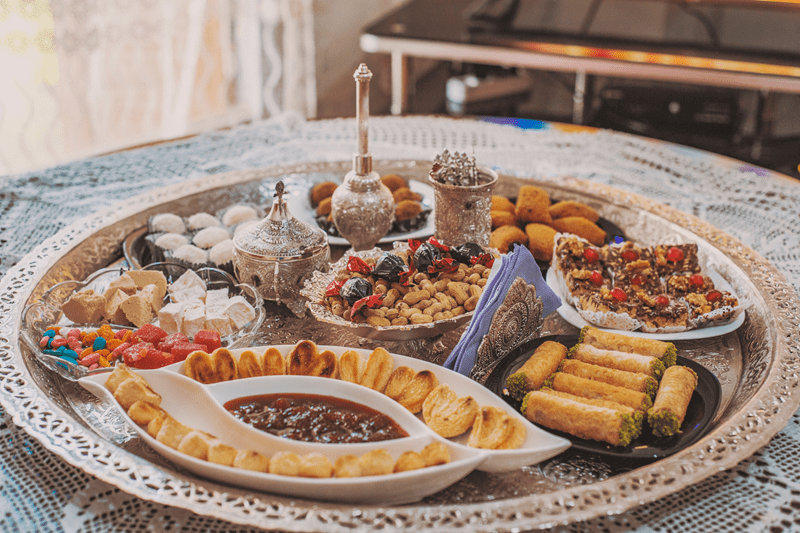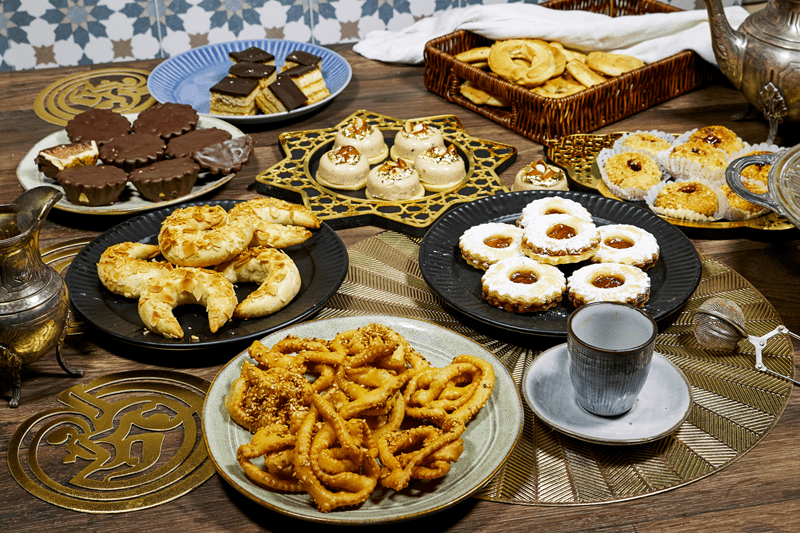
An Algerian breakfast feels like the calm before the day begins. It’s not rushed. It’s not loud. It’s simple, quiet, and full of warmth. Families gather around a small table, sharing bread, tea, and laughter. Every bite feels familiar and every smell reminds people of home. It’s not about fancy dishes — it’s about comfort and togetherness that starts every morning in Algeria.
The first meal of the day in Algeria isn’t just about eating. It’s about feeling connected. The variety of Algerian morning dishes shows how people across the country hold onto old traditions, keeping them alive through food.
Chakhchoukha is a dish that many Algerians hold close. It’s made from pieces of flatbread mixed with a flavorful sauce, vegetables, and spices. Sometimes it’s eaten during special mornings or family days. It is soft, rich, and full of comfort.
Tammina is made from semolina and often served during calm mornings. The texture is smooth, and it’s usually eaten with a cup of tea or coffee. There’s something simple about it. Something that feels like care.
Msemen is one of the most loved Algerian morning dishes. It’s a square, layered flatbread cooked until golden brown. When torn apart, it’s soft inside and crispy outside. People eat it with honey, jam, or sometimes just plain. It’s the kind of food that feels right no matter how you eat it.
In Algeria, bread isn’t just food. It’s a part of daily life. It’s on every breakfast table, made in many forms, with recipes passed down from one generation to another. The many Algerian breads tell the story of homes, mothers, and mornings that feel warm.
The name itself means “home bread.” Khobz Eddar is baked early in the morning, filling the kitchen with a smell that feels comforting. It’s soft inside with a crusty outside. Every home gives it a small twist — a few seeds on top, or a bit of milk in the dough.
Kesra is round and flat. It’s made from semolina and cooked on a flat griddle. It has a crisp surface and a tender center. It’s eaten with olive oil, butter, or sometimes dipped in tea. It’s one of those Algerian breads that never gets old, no matter how often it’s made.
Matlou is soft and full of air. When cooked, it puffs up beautifully on a pan. Families eat it with almost everything — jam, eggs, or spreads. It’s always there, even when nothing else is cooked yet.

Mornings in Algeria aren’t only about bread. There’s more — eggs, vegetables, and small savory dishes that make the table colorful. The Algerian omelette is one of those dishes that never feels too heavy but always feels just right.
The Algerian omelette is simple. Tomatoes, onions, and herbs — cooked slowly until soft and full of flavor. It’s not fancy. It’s the kind of food that fills the house with a familiar smell, the one that makes people gather at the table without being called.
On some mornings, people make fritters using chickpea flour or potatoes. They’re light and crispy. Some even prepare savory cakes that go well with tea or bread. In coastal towns, these are especially popular, giving breakfast a local taste.
Many families add small plates of olives, roasted peppers, or tomato spreads. It’s a mix of colors and flavors that make the table look alive. These small sides add freshness to the Algerian omelette and balance the meal.
The mix of eggs, vegetables, and bread creates a breakfast that’s simple yet full of variety. That’s what makes it special.
Every morning in Algeria feels a bit different, but there’s one thing that never changes — the feeling of togetherness. Breakfast traditions in Algeria are about slowing down before the day begins.
Families sit around a small table. There is tea or coffee, a plate of msemen or matlou, maybe some olive oil or jam on the side. Conversations start slowly, maybe a joke or two, maybe silence. In rural areas, people add dates or fresh fruit from the garden.
In cities, mornings are quicker. People grab something simple before heading out. But even then, they try to keep the same spirit — calm and warm. The idea is not about what is served. It’s about sharing a few peaceful minutes with family or friends before the day gets busy.
These small breakfast traditions in Algeria show how food isn’t only about taste. It’s about keeping connections alive.
Algeria is large, and each region has its own way of greeting the morning. The regional breakfast foods show how people adapt to their surroundings but keep the same heart in every meal.
In the north, where the air is cool, breakfasts are lighter. People enjoy bread with olive oil, cheese, and sometimes fresh vegetables. The food is mild, and the mornings feel slow and calm.
In the central parts, breakfast is a bit heavier. Dishes like msemen, tammina, and the Algerian omelette are common. It’s a mix of flavors that feels homely. Families take time to eat together, especially on weekends.
In the south, the desert mornings are quiet. People eat dates, semolina breads, and drink tea. The ingredients are simple, often grown or made locally. The food matches the pace of life — calm and steady.
These regional breakfast foods remind everyone that Algeria may be wide and diverse, but mornings everywhere still begin with bread, tea, and kindness.
Every Algerian breakfast has a Algerian beverages that brings the table to life. Whether it’s tea, coffee, or milk, these drinks are a big part of morning routines.
It is a special drink that is brewed slowly. The mint tea poured high to make a light foam, and shared with everyone. It’s not just a drink — it’s a way to say, “You’re welcome here.”
Coffee is a strong, smooth, and comforting drink. The smell alone is enough to wake the house. For many, it’s the first thing they look forward to after getting out of bed.
In some families, milk or simple herbal drinks are served instead. These are gentle, often preferred by elders or children.
An Algerian breakfast is not about variety or size. It’s about warmth, care, and a sense of belonging. From Algerian breads to the Algerian omelette and sweet mint tea, each dish tells a story of tradition. It shows how simple food can bring people closer and how mornings can feel calm even in a busy world.
This content was created by AI